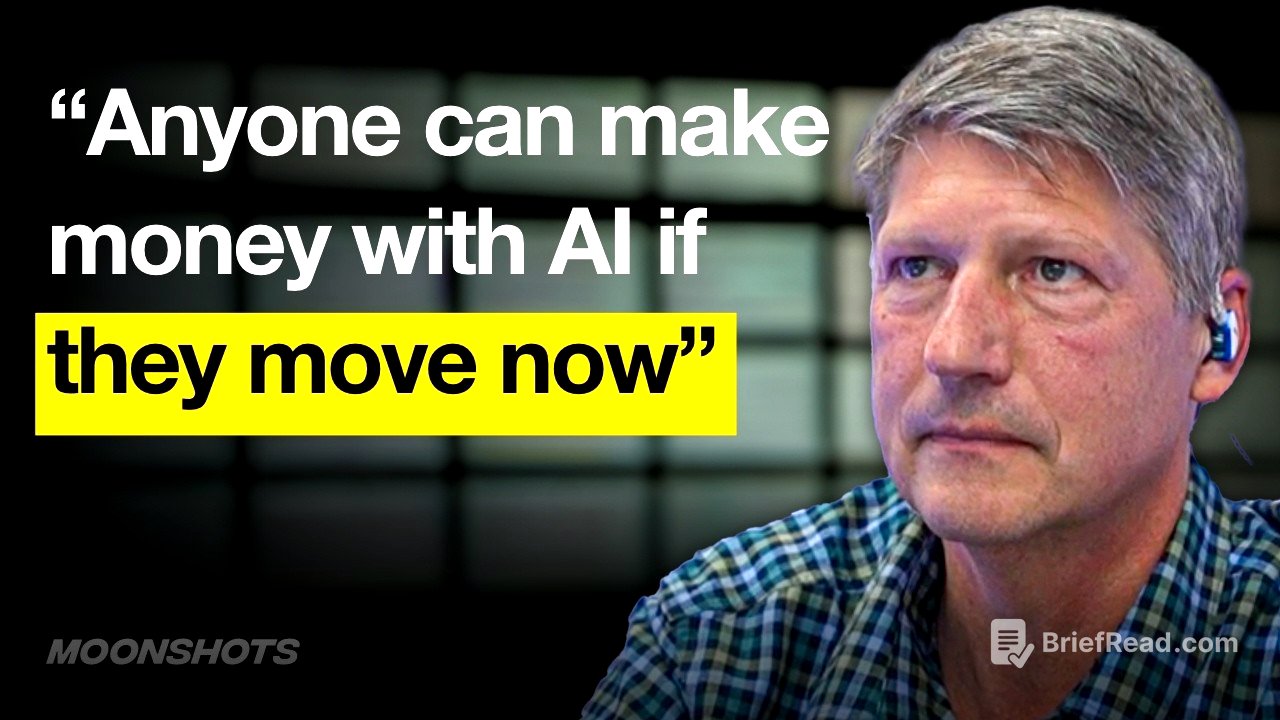TLDR;
This episode of Moonshots discusses the rapid advancements and impacts of AI across various sectors. It covers the exponential growth of AI startups, investment opportunities, the future of AI models, infrastructure needs, and the talent war. It also touches on superintelligence, AI music, job displacement, brain-computer interfaces, and humanoid robots. The conversation highlights the need for innovative thinking, strategic investment, and adaptation to thrive in this rapidly evolving landscape.
- AI is accelerating startup growth and revenue generation.
- Investment opportunities in AI are vast, spanning chips, data centers, and power.
- The talent war in AI is intense, with companies offering massive compensation packages.
- Superintelligence is on the horizon, raising both excitement and concerns.
- AI is impacting various sectors, including music, employment, and healthcare.
AI's Impact on Startup Growth [0:00]
The discussion begins with an overview of how AI is rapidly accelerating startup growth and revenue generation. It's noted that the traditional paths to revenue are being compressed, leading to faster stabilization for companies. There's a significant increase in the number of unicorns, with 36 emerging in just half a year. The median time to reach $1 million in annual revenue has decreased from 16 months to 5 months, and to reach $5 million, it has dropped from 41 months to 13 months, marking a 4x acceleration. This rapid growth is attributed to the scalability provided by cloud services and the additional boost from AI, which is rewriting the rules of business.
Navigating Investment Opportunities in AI [11:08]
The conversation shifts to investment opportunities in the AI landscape. It's emphasized that investors need to identify where to allocate capital to ride the AI wave, considering areas such as real estate, data centers, chips, and power. The discussion highlights the concept of "vibe valuations," where investors bet big on AI startups with limited traditional metrics. It's mentioned that accessing early-stage AI companies is crucial, as later-stage valuations can be prohibitive. Strategies for investing in AI include focusing on specific domains, identifying AI companies that add value, and investing in seed-stage venture funds.
The Future of AI Models and Technologies [16:45]
The speakers discuss the release of Super Grok and the anticipation of GPT-5, with predictions for its release timeline. GPT-5 aims to strengthen user trust by avoiding ad-influenced answers. The performance of Grok 4 on "humanity's last exam" is mentioned, highlighting the AI's ability to answer complex questions across various subjects. However, one of the speakers argues that these tests are mostly irrelevant, comparing it to a calculator's ability to perform calculations faster than a human. The real question is what we do with AI and how we use it. The discussion touches on Apple's potential use of Anthropic or OpenAI for Siri, indicating a smart move in response to desperation.
The State of AI Infrastructure and Power Needs [33:46]
The discussion addresses the infrastructure and power needs of large-scale AI models. XAI's cluster, with its extensive collection of Nvidia GPUs, is highlighted, along with Elon Musk's goal of reaching a million GPUs by the end of the year. The limits are not the GPUs, the limits are our electrical available power system. To support this, XAI acquired a fully built overseas gas turbine power plant. The need for disruptive thinking and unconventional approaches to secure power for AI infrastructure is emphasized.
The Rise of Young Entrepreneurs [44:59]
The conversation shifts to the rise of young entrepreneurs in the AI space. The success story of Brendan Foody, the young founder of Merkore, is shared, highlighting the trend of younger individuals creating unicorns. The reasons for this trend include unconstrained thinking, access to tools like vibe coding and large language models, and a digitally native mindset. The discussion emphasizes the importance of unconstraining oneself from traditional career paths and embracing the opportunities in the AI revolution.
The Talent War in AI [50:58]
The intense competition for talent in the AI industry is discussed, with companies like Meta and OpenAI offering massive compensation packages. OpenAI's significant spending on stock-based compensation is noted, emphasizing the value placed on AI talent. The availability of cash on the balance sheets of major tech companies is highlighted, indicating their willingness to invest heavily in acquiring top talent. The discussion touches on Mark Zuckerberg's efforts to build a dream team at Meta and the increasing focus on superintelligence.
Superintelligence: The Next Frontier [58:41]
The conversation transitions to the topic of superintelligence, with Zuckerberg stating that super intelligence is coming into sight. The definitional problem of superintelligence is discussed, with a call for a clear definition. The discussion touches on the potential risks and benefits of superintelligence, with varying perspectives on its impact on humanity.
The Rise of AI Music and Virtual Bands [1:07:35]
The emergence of AI music and virtual bands is explored, with the example of Velvet Sundown, an AI band with over a million monthly listeners on Spotify. The potential for AI to compose new songs for existing bands and create virtual concerts is discussed. The rights owners should get on board with AI instead of suing the AI companies.
Job Displacement and AI's Impact on Employment [1:15:08]
The discussion addresses the impact of AI on employment, with Amazon's CEO stating that AI will take some jobs but make others more interesting. The statistic that AI has already replaced 94,000 tech workers in the first half of 2025 is mentioned. Vinod Khosla's prediction that AI will replace 80% of jobs by 2030 is discussed, along with the potential for humanoid robots to become more affordable. The discussion touches on the need for individuals to adapt and reinvent themselves in the face of job displacement.
Breakthroughs in Brain-Computer Interfaces [1:24:24]
The conversation shifts to breakthroughs in brain-computer interfaces (BCIs), with Neuralink's roadmap for future developments. The potential for BCIs to enable individuals to control devices, restore vision, and integrate with AI is discussed. The discussion touches on the ethical considerations of BCIs and the importance of augmenting the human experience.
Humanoid Robots and Future Innovations [1:32:41]
The episode concludes with a discussion of humanoid robots and future innovations. Beijing is hosting the world's first humanoid robot games. The use of robots in Amazon warehouses and for last-mile delivery is mentioned. The potential for robots to solve the US debt problem by building more robots and AIs is discussed. The conversation touches on the need to think about new measures of success beyond GDP in an era of increased efficiency.



![Digimon The Movies Collection: Our War Game, Hurricane Touchdown Blu-Ray/New Dub Review [Soundout12]](https://wm-img.halpindev.com/p-briefread_c-10_b-10/urlb/aHR0cDovL2ltZy55b3V0dWJlLmNvbS92aS9LdFZJckdkdHZROC9ocWRlZmF1bHQuanBn.jpg)





